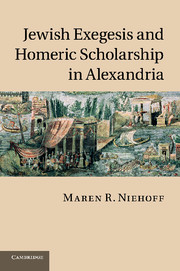Book contents
- Frontmatter
- Contents
- Acknowledgements
- List of abbreviations
- 1 Setting the stage
- Part I Early Jewish responses to Homeric scholarship
- Part II Critical Homeric scholarship in the fragments of Philo's anonymous colleagues
- Part III The inversion of Homeric scholarship by Philo
- Epilogue
- References
- Index of Greek terms
- Index of sources
- Index of modern authors
- General index
Epilogue
Published online by Cambridge University Press: 03 May 2011
- Frontmatter
- Contents
- Acknowledgements
- List of abbreviations
- 1 Setting the stage
- Part I Early Jewish responses to Homeric scholarship
- Part II Critical Homeric scholarship in the fragments of Philo's anonymous colleagues
- Part III The inversion of Homeric scholarship by Philo
- Epilogue
- References
- Index of Greek terms
- Index of sources
- Index of modern authors
- General index
Summary
Stressing the importance of Alexandria as the centre of literal Homeric scholarship in the Hellenistic world, I have analysed for the first time Jewish exegetical works in light of the Alexandrian scholia to Homer. The scholia have never been translated from Greek into any other language and are available only in the form of running comments on the Homeric text, rather than in thematic arrangement, thus rendering access to them very difficult. Their relevance to Alexandrian Bible exegesis has thus far not been recognized.
My comparison of Homeric and Biblical hermeneutics has shown that Jewish intellectuals in Alexandria were acutely aware of the academic methods developed at the Museum. While there were lively controversies among Alexandrian Jews regarding the nature and legitimacy of Homeric scholarship, the overall picture is one of impressive creativity in dialogue with the surrounding culture. Jewish Bible scholars offered the first critical studies of the canonical text, thus anticipating modern research by more than two thousand years.
Each of this book's three parts has treated a separate category of Alexandrian Bible exegesis. The first has examined the early sources from the Ptolemaic period, throwing completely new light on each of them.The Letter of Aristeas is shown to be conservative, defending the biblical text against critical methods. The fragments from Demetrius have been read with special emphasis on his references to already existing questions and answers, which are used to reconstruct the history of this genre from Aristotle onwards.
- Type
- Chapter
- Information
- Jewish Exegesis and Homeric Scholarship in Alexandria , pp. 186 - 187Publisher: Cambridge University PressPrint publication year: 2011

